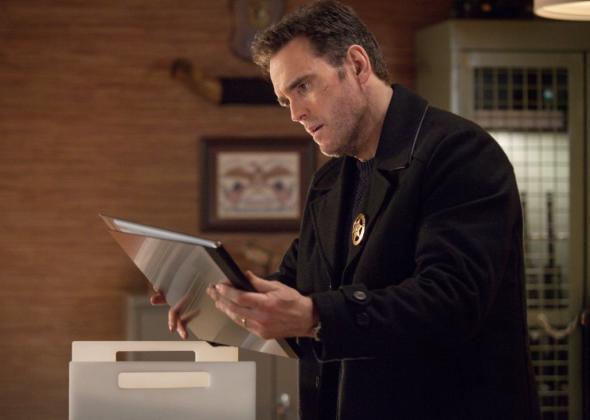Major spoilers for Wayward Pines below.
The first episode of Wayward Pines—the Fox miniseries from M. Night Shyamalan that returns from its midseason break on Thursday—feels like a rote but entertaining rip-off of Twin Peaks. As my colleague June Thomas noted, the next three episodes register as a mashup of Lost and The Prisoner. When the fifth episode began, I expected the show to borrow a few more ideas from its predecessor, deepen its own mythology, and maybe resolve some of the more glaring questions about its basic premise.
Instead, it blew my mind, pulling off perhaps the most brilliant, bonkers twist I’ve ever seen on TV. Throughout the first half of the series, we’re led to believe that Wayward Pines is some kind of open-air prison, a holding cell for people who know too many government secrets. Then Ben Burke (Charlie Tahan), the angsty son of our protagonist Ethan Burke (Matt Dillon), is ushered into a Kubrickian room and told “the truth.” Wayward Pines is not a prison. It is a refuge—2,000 years in the future. Humans have devolved into “abbies,” aberrant monsters who roam the Earth in packs in search of flesh to devour. Wayward Pines is protected from abbies by an electrified wall, and its inhabitants are all citizens of the ’90s and aughts who have somehow been preserved and revived to further the project of humanity.
Or so Ben is told. In a show this twisty, it’s difficult to get a firm grasp on what’s reality and what’s deception. Alarm bells go off when Ben’s teacher informs him that only Wayward Pines’ children are permitted to know the truth; it is hidden from the adults, who, presumably, would not be able to live with the news. Still, the show dares to reveal both the abbies and a crumbling Boise of the future. If this twist is yet another ruse, Shyamalan has a lot of explaining to do.
But even if “the truth” isn’t the truth—even if there are less delightful twists to come—I’m still extremely impressed by what Wayward Pines is doing. Many of Shyamalan’s post-Sixth Sense projects have been plagued by the same problem: Once we know the twist, the bulk of the movie is vastly less enjoyable. As soon as we learn that the monsters in The Village are fake, or that Samuel L. Jackson’s character in Unbreakable is actually evil, everything that came before is much less entertaining in retrospect. Enjoyable as those movies may be the first time around, a second viewing would be a total slog. The heavy-handed deceptions and foreshadowing are just plain boring.
Wayward Pines solves this problem by employing a twist that deepens, rather than cheapens, our enjoyment of everything that preceded it. The mid-series shocker brings the first four episodes into sharper focus, explaining several dangling questions while making a few of the characters and plot points even more mysterious. If the series ended with episode five’s big reveal, the show would be a success—an eerie and surreal potboiler with a stunning dystopian ending.
But of course, the show isn’t ending now: It still has five episodes to go, plenty of time to veer off course like so many of Shyamalan’s films have. This time, however, Shyamalan is working with good source material—a series of popular novels which I obviously haven’t read—so I’m optimistic he’ll stick the landing. Plus, while Shyamalan produced the show and directed its first episode, he’s gotten a stable of talented directors to oversee the other episodes. The show, in other words, is in good hands. And even if it ultimately spirals out of control, those first five episodes have been worth it.
